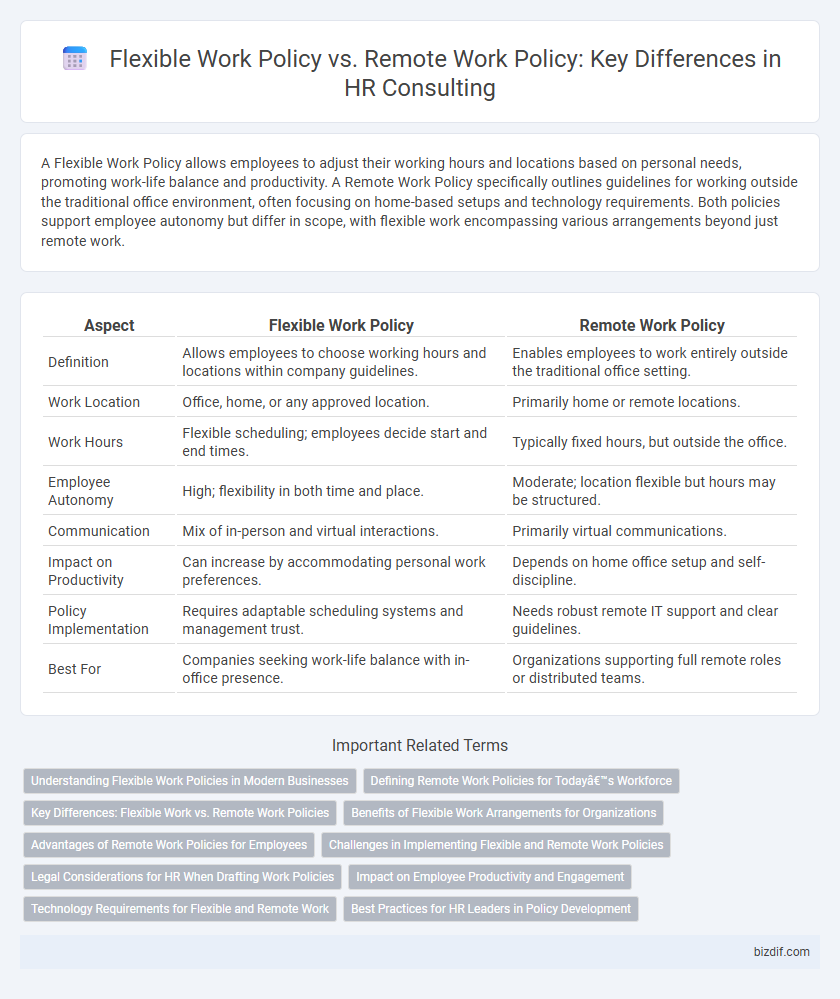A Flexible Work Policy allows employees to adjust their working hours and locations based on personal needs, promoting work-life balance and productivity. A Remote Work Policy specifically outlines guidelines for working outside the traditional office environment, often focusing on home-based setups and technology requirements. Both policies support employee autonomy but differ in scope, with flexible work encompassing various arrangements beyond just remote work.
Table of Comparison
| Aspect | Flexible Work Policy | Remote Work Policy |
|---|---|---|
| Definition | Allows employees to choose working hours and locations within company guidelines. | Enables employees to work entirely outside the traditional office setting. |
| Work Location | Office, home, or any approved location. | Primarily home or remote locations. |
| Work Hours | Flexible scheduling; employees decide start and end times. | Typically fixed hours, but outside the office. |
| Employee Autonomy | High; flexibility in both time and place. | Moderate; location flexible but hours may be structured. |
| Communication | Mix of in-person and virtual interactions. | Primarily virtual communications. |
| Impact on Productivity | Can increase by accommodating personal work preferences. | Depends on home office setup and self-discipline. |
| Policy Implementation | Requires adaptable scheduling systems and management trust. | Needs robust remote IT support and clear guidelines. |
| Best For | Companies seeking work-life balance with in-office presence. | Organizations supporting full remote roles or distributed teams. |
Understanding Flexible Work Policies in Modern Businesses
Flexible work policies in modern businesses allow employees to adjust their work hours and locations to better balance personal and professional responsibilities, enhancing productivity and job satisfaction. Unlike remote work policies that primarily focus on location flexibility, flexible work policies encompass a variety of options such as flextime, compressed workweeks, and hybrid schedules. Implementing comprehensive flexible work policies supports employee well-being and attracts top talent by aligning workplace practices with contemporary lifestyle needs and technological advancements.
Defining Remote Work Policies for Today’s Workforce
Defining remote work policies involves clearly outlining eligibility, communication protocols, and productivity expectations to support a diverse and distributed workforce. Flexible work policies emphasize adaptability in work hours and locations, whereas remote work policies concentrate specifically on the logistics and guidelines of working outside the traditional office environment. Incorporating technology use, security measures, and performance metrics ensures these policies address the unique challenges of remote work in today's dynamic labor market.
Key Differences: Flexible Work vs. Remote Work Policies
Flexible Work Policy allows employees to vary their working hours and locations, including on-site, remote, or hybrid options, promoting work-life balance and productivity. Remote Work Policy specifically mandates or permits employees to perform their duties entirely off-site, leveraging digital tools and communication platforms. Key differences include flexibility in time management under Flexible Work, whereas Remote Work emphasizes location independence, each requiring tailored HR strategies and technology support.
Benefits of Flexible Work Arrangements for Organizations
Flexible work arrangements enhance organizational productivity by allowing employees to tailor their schedules, which leads to improved job satisfaction and reduced turnover rates. These policies foster a diverse and inclusive workplace by accommodating various personal needs and time zones, thereby expanding access to a global talent pool. Implementing flexible work strategies also decreases operational costs related to office space and utilities, contributing to overall business efficiency and sustainability.
Advantages of Remote Work Policies for Employees
Remote work policies enhance employee autonomy by allowing flexible schedules and reducing commute time, leading to improved work-life balance and increased productivity. Employees benefit from a customized work environment that can reduce stress and improve focus, promoting overall job satisfaction. Access to remote work options can also broaden talent pools and support diversity by accommodating various personal and geographical needs.
Challenges in Implementing Flexible and Remote Work Policies
Implementing flexible work policies often faces challenges such as maintaining consistent communication, ensuring employee accountability, and adapting management practices to diverse work schedules. Remote work policies present difficulties including securing reliable technology infrastructure, safeguarding data privacy, and fostering team cohesion despite physical distance. Both policies require robust HR strategies to balance operational efficiency with employee well-being and engagement.
Legal Considerations for HR When Drafting Work Policies
Legal considerations for HR when drafting flexible work policies versus remote work policies include compliance with labor laws, data privacy regulations, and workplace safety standards. Flexible work policies require clear guidelines on work hours and location to avoid disputes, while remote work policies must address cybersecurity, employee monitoring, and equipment liability. Understanding jurisdictional differences and ensuring nondiscrimination provisions are critical to mitigating legal risks in both policy types.
Impact on Employee Productivity and Engagement
Flexible work policies enhance employee productivity and engagement by accommodating diverse work styles and schedules, leading to higher job satisfaction and reduced burnout. Remote work policies specifically promote productivity through location independence but may challenge engagement due to reduced in-person interactions and collaboration. Balancing flexibility and remote work strategies allows HR consulting professionals to optimize workforce performance and employee well-being.
Technology Requirements for Flexible and Remote Work
Flexible work policies require technology infrastructures that support seamless transitions between in-office and remote environments, emphasizing cloud-based collaboration tools, secure VPN access, and adaptable communication platforms. Remote work policies demand robust cybersecurity measures, reliable high-speed internet, and comprehensive IT support to ensure productivity and data protection from any location. Both policies rely heavily on scalable technology solutions to maintain employee connectivity and operational efficiency across diverse work settings.
Best Practices for HR Leaders in Policy Development
HR leaders developing flexible work policies should prioritize clear guidelines that balance employee autonomy with organizational accountability, incorporating core hours and availability expectations to ensure productivity. Remote work policies must address cybersecurity protocols, communication norms, and technology support to maintain operational integrity and employee engagement. Integrating employee feedback and regularly reviewing policy effectiveness fosters adaptability and alignment with evolving workforce needs.
Flexible Work Policy vs Remote Work Policy Infographic

 bizdif.com
bizdif.com